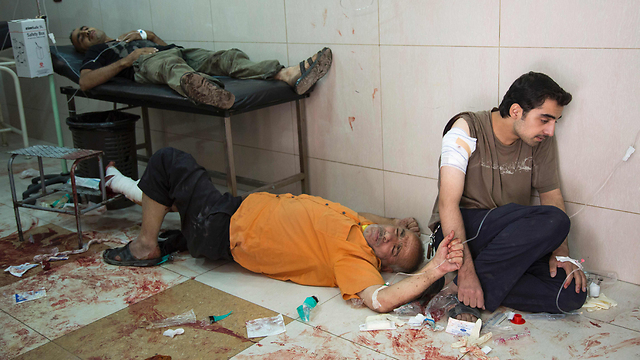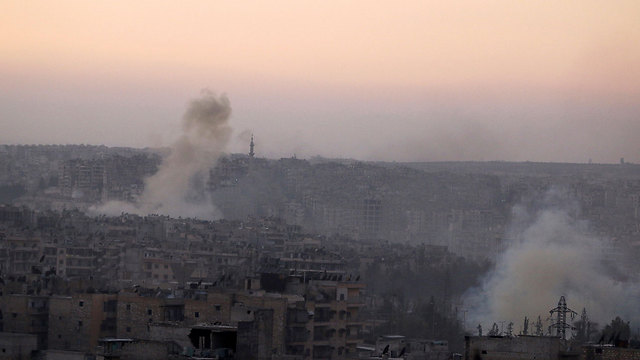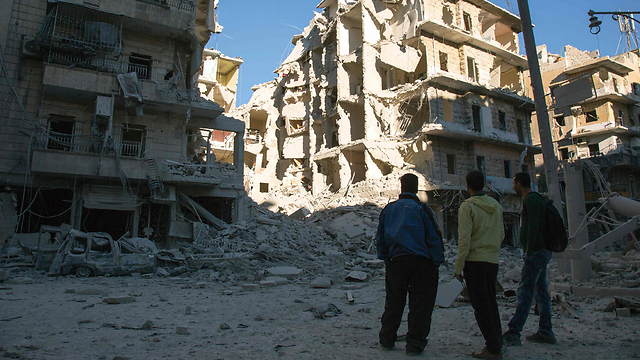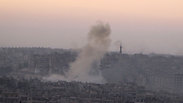
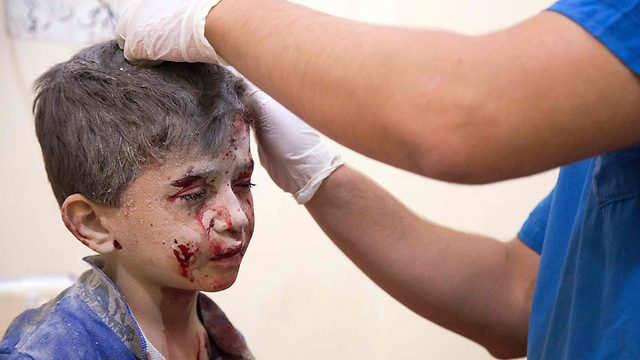
The cold calculation behind hospital bombings
With the death toll and destruction in Aleppo rising, the repeated bombings of hospitals and the resulting casualties have taken center stage in the conflict; 'Killing doctors in rebel-held territory reduces the number of their fighters that can be treated for injuries sustained in combat, the logic goes.'
So widespread and systematic are the repeated airstrikes against medical facilities that many observers monitoring Syria are convinced that the strikes are part of a targeted campaign and not collateral or accidental damage. Under the rules of war, deliberate attacks of this nature could constitute war crimes.
“Instead of helping get lifesaving aid to civilians, Russia and Syrian President Bashar Assad are bombing the humanitarian convoys, hospitals and first responders who are trying desperately to keep people alive,” Samantha Power, the United States Ambassador to the United Nations, said recently to a UN Security Council emergency meeting.
Near simultaneous attacks on different hospitals, repeated strikes, and the use of “double-taps” – where a second bomb is dropped on the same location several minutes after a first strike in order to hit first responders – have been cited as evidence for these claims.
Observers are arguing that a cold logic of attrition is the thinking behind the attacks.
“The Syrian government understands that when you kill a doctor… it’s not just the loss of that individual’s life but it can be the loss of all the lives that the doctor could have saved,” Widney Brown, Director of Programs at the US-based Physicians for Human Rights, told The Media Line. "Killing doctors in rebel-held territory reduces the number of their fighters that can be treated for injuries sustained in combat, the logic goes."
"Each doctor’s death has a permanent impact as there are no new doctors available to replace those killed," says Brown, who documents strikes on health care facilities and staff as part of her work with the non-profit. "The number of doctors working in Syria has decreased due to sniper and bombing attacks and through detention by government forces, Brown explained. Others have simply fled the country fearing for their lives and the lives of their families.
But the logic goes beyond simply obstructing the Syrian Opposition’s access to medical care. Attacks on facilities are "an attempt to make life for civilians in rebel held areas of Aleppo so hellish that they flee the area," said Tim Eaton, research fellow for the Middle East and North Africa at London’s Chatham House thinktank. The “cold hearted pragmatism” is to bomb all facilities in an area which are critical for civilians to live in order to drive them out and to allow government forces to take control, Eaton said.
This is a strategy learned by the Russian military during its conquest of Grozny in 2000 during the unsuccessful Chechen independence drive, the analyst suggested. “If you look since the Russian intervention in Syria last year, the Grozny-style tactic of depopulation has taken sway since that point,” he explained.
Following the fighting and siege warfare in Grozny, which claimed the lives of thousands, the UN described the capital as the most destroyed city on the planet.
While acknowledging the similarities in the “scorched earth policy” in Aleppo to the devastation wrought in the Chechen capital, Brown suggested that the policy was not a shift introduced by Russian military planners. The Russian intervention “brought much greater fire power… but the targeting policy was always on civilians, that hasn’t changed,” she explained.
As well as force, the Syrian government is attempting to persuade citizens to leave Opposition-held territory. “The Assad government has said it will allow civilians to evacuate the area of Aleppo by creating a humanitarian passage,” Derek Averre, a scholar in Russian foreign and security policy at the University of Birmingham, told The Media Line, adding, “this allows the government to retake the area and leaves the opposition nowhere to go.”
A lack of action by the international community has allowed the violence in Syria to escalate to this level, Dr. Osama Abo El Ezz, SAMS’s Aleppo Field Coordinator said. “M10 was not destroyed by bombs. It was destroyed because of the silence and inaction of the international community that knows what’s happening in Aleppo,” he said, in the non-profit’s recent press release.
Article written by Rob Swift
Reprinted with permission from The Media Line















